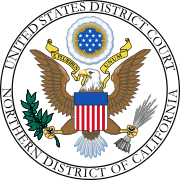| Bernstein I | |
|---|---|
 | |
| Court | United States District Court for the Northern District of California |
| Full case name | Daniel J. Bernstein et al., v. United States Department of State et al. |
| Decided | April 15, 1996 |
| Citation | 922 F. Supp. 1426 |
| Court membership | |
| Judge sitting | Marilyn Hall Patel |
| Bernstein II | |
|---|---|
 | |
| Court | United States District Court for the Northern District of California |
| Full case name | Daniel J. Bernstein et al., v. United States Department of State et al. |
| Decided | December 9, 1996 |
| Citation | 945 F. Supp. 1279 |
| Court membership | |
| Judge sitting | Marilyn Hall Patel |
| Bernstein III | |
|---|---|
 | |
| Court | United States Court of Appeals for the Ninth Circuit |
| Full case name | Daniel J. Bernstein et al., v. United States Department of State et al. |
| Decided | May 6, 1999 |
| Citation | 176 F.3d 1132 |
| Case history | |
| Prior action | Hon. Marilyn Hall Patel ruled for plaintiff in 974 F.Supp. 1288 |
| Court membership | |
| Judges sitting | Betty Binns Fletcher, Myron H. Bright, Thomas G. Nelson |
| Case opinions | |
| Opinion by Fletcher Concurrence by Bright Dissent by Nelson | |
Bernstein v. United States was a series of court cases filed by Daniel J. Bernstein, a mathematics Ph.D. student at the University of California, Berkeley, challenging U.S. government restrictions on the export of cryptographic software. In the early 1990s, the U.S. government classified encryption software as a "munition," imposing strict export controls. As a result, Bernstein was required to register as an arms dealer and obtain an export license before he could publish his encryption software online.
With the support of the Electronic Frontier Foundation (EFF), Bernstein filed a lawsuit against the U.S. government, arguing that the export controls violated his First Amendment rights. The case ultimately led to a relaxation of export restrictions on cryptography, which facilitated the development of secure international e-commerce. The decision has been recognized by First Amendment and technology advocacy groups for affirming a "right to code" and applying First Amendment protections to code as a form of expression.[1][2]
- ^ Dame-Boyle, Alison (April 16, 2015). "EFF at 25: Remembering the Case that Established Code as Speech". Electronic Frontier Foundation. Retrieved November 8, 2024.
- ^ "Bernstein v. United States Department of States (District Court of California) (1997)". The Free Speech Center. Retrieved November 8, 2024.